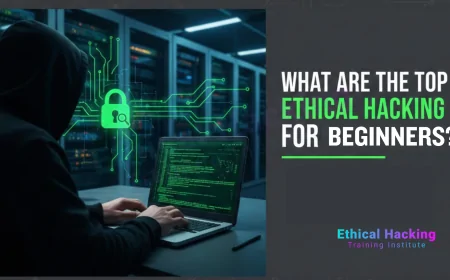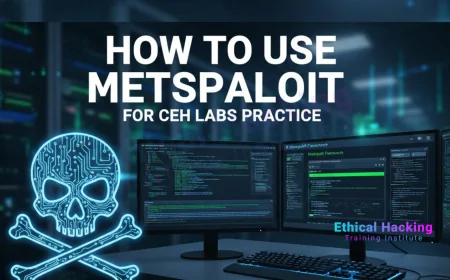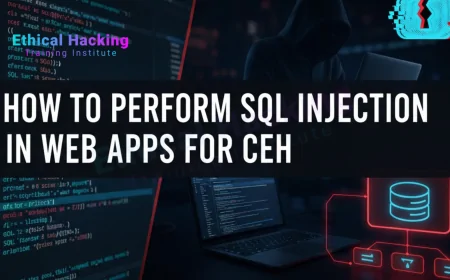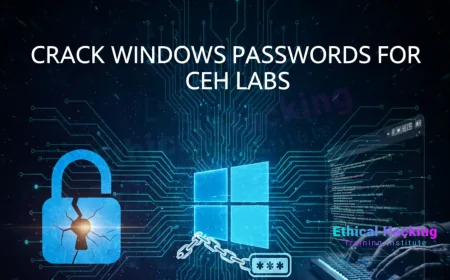Ethical Hacking Course Admission Process in Pune | Complete 2025 Guide
Explore the complete 2025 admission process for ethical hacking courses in Pune. Learn about eligibility, required documents, course types, fees, and how to apply for top cybersecurity training programs without naming specific institutes.
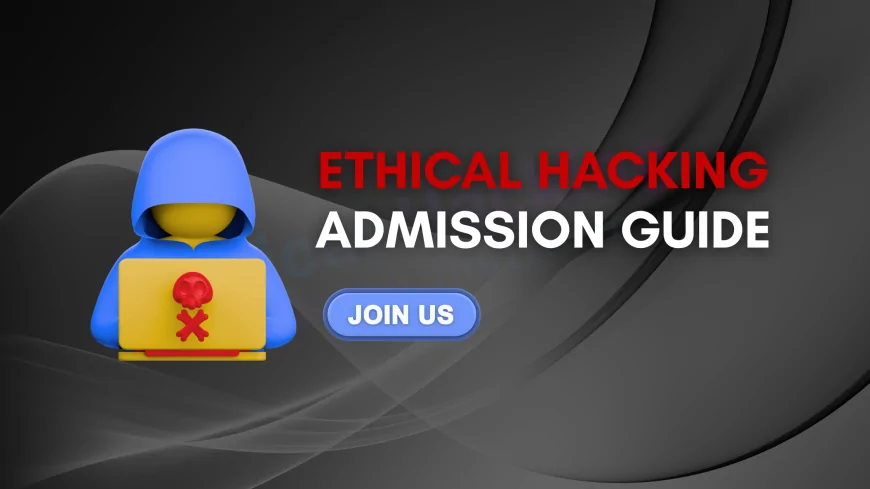
In an era where digital threats are growing rapidly, the demand for cybersecurity professionals—especially ethical hackers—is at an all-time high. Pune, known as the educational and IT capital of India, has emerged as a prime location for pursuing ethical hacking education. This blog offers a detailed look into the admission process at ethical hacking institutes in Pune for 2025, providing a clear and structured pathway for aspiring cybersecurity professionals.
Why Pune is a Hub for Ethical Hacking Education
Pune has long been home to a strong IT and tech ecosystem, supported by a thriving educational infrastructure. With numerous IT companies, cybersecurity startups, and tech parks, the city offers a practical environment where theory meets application. Additionally, Pune boasts a rich pool of instructors and industry experts who contribute to the growing reputation of its ethical hacking training ecosystem.
Overview of Ethical Hacking as a Career
Ethical hacking, also known as penetration testing or white-hat hacking, involves legally breaking into systems to identify vulnerabilities. Ethical hackers play a crucial role in strengthening organizational security. With the rise in cybercrimes and data breaches, skilled ethical hackers are now vital assets in every industry—from finance to healthcare.
Eligibility Criteria for Admission
Most ethical hacking institutes in Pune have flexible eligibility criteria, allowing individuals from various academic backgrounds to apply. Common requirements include:
-
Minimum Age: 16–18 years, depending on the course level
-
Education: Basic computer knowledge or 10+2 education for beginner courses
-
Technical Background: While not mandatory, knowledge of networking, operating systems, or programming can be beneficial
Advanced courses may require prior knowledge or certification in basic cybersecurity principles.
Step-by-Step Admission Process
Here’s a general step-by-step process for enrolling in an ethical hacking course in Pune:
-
Research Courses: Understand the curriculum, duration, and outcomes of the course you’re interested in.
-
Submit an Application Form: Fill out an online or offline admission form with your personal and academic details.
-
Upload/Submit Required Documents: Attach necessary documents like identity proof, academic certificates, etc.
-
Take an Aptitude Test (if applicable): Some institutes may require you to pass a basic cybersecurity or logical reasoning test.
-
Interview or Counseling Session: An informal interview or consultation is often part of the process.
-
Payment of Fees: After selection, pay the registration fee or the first installment of tuition.
-
Enrollment Confirmation: You receive a welcome kit or student ID, marking the official start of your journey.
Entrance Exams or Aptitude Tests (if any)
While many beginner-level courses do not require an entrance test, some institutes conduct a basic aptitude test to evaluate logical thinking, analytical skills, or foundational knowledge in networking. These tests are usually simple and intended to assess your preparedness rather than disqualify candidates.
Document Requirements
Common documents required during admission include:
-
Passport-size photograph
-
Government-issued ID (Aadhaar card, PAN card, etc.)
-
Mark sheets or academic transcripts (10th/12th or graduation)
-
Proof of work experience (if applying for advanced courses)
-
Updated resume (optional but recommended for career-track programs)
Interview or Counseling Process
Some institutes conduct personal counseling sessions or interviews to guide you toward the most suitable course based on your background and goals. This helps ensure students are well-matched with the program, whether they are beginners, intermediate learners, or professionals.
Modes of Admission – Online vs. Offline
Pune-based institutes typically offer both online and offline admissions:
-
Offline Admission: Walk-in admissions involve a visit to the institute, followed by form submission and counseling.
-
Online Admission: The more popular method post-2020, it involves filling out an application form on the official website, uploading documents, and making fee payments digitally.
Intake Periods and Application Deadlines
Most ethical hacking institutes operate on a rolling admission basis with monthly or quarterly intakes. However, flagship programs may have fixed batches with specific deadlines. Early applications are encouraged, especially for courses with limited seats or internship placements.
Course Levels – Foundation to Advanced
Institutes offer a range of courses such as:
-
Beginner Level: Introduction to Ethical Hacking, basic cybersecurity, and tools
-
Intermediate Level: Network security, Linux, scripting, and vulnerability assessment
-
Advanced Level: CEH prep, penetration testing, bug bounty, and red teaming
The admission process may vary slightly depending on the level you’re applying for.
Fee Structure and Payment Methods
Fees range widely based on course duration, depth, and delivery mode:
-
Short-term certification courses: ₹10,000 to ₹25,000
-
Comprehensive programs: ₹30,000 to ₹80,000
-
CEH or global certification prep: ₹70,000 to ₹1.5 lakh
Most institutes offer flexible payment options including EMI, net banking, UPI, or card payments.
Scholarships and Financial Aid
Some institutes in Pune offer merit-based scholarships, early bird discounts, or group discounts. Financial assistance may also be available through:
-
Education loan tie-ups
-
Government skill development programs
-
Corporate sponsorships for working professionals
Tips to Strengthen Your Application
To improve your chances of admission into a top ethical hacking program:
-
Showcase any prior knowledge or certifications (e.g., CompTIA Security+, networking)
-
Write a compelling statement of purpose if the application form allows
-
Maintain a professional tone in your resume and application
-
Apply early and follow up professionally
-
Attend webinars or orientation sessions to demonstrate your interest
Common Mistakes to Avoid During Admission
-
Submitting incomplete or incorrect documents
-
Ignoring eligibility criteria for advanced programs
-
Missing deadlines for limited-batch courses
-
Not preparing for an aptitude test if one is required
-
Choosing a course without understanding its outcome or job scope
Post-Admission Orientation and Onboarding
Once admitted, students typically go through a structured orientation that includes:
-
Introduction to instructors and peers
-
Overview of the course curriculum and tools
-
Platform access and login setup for online learners
-
Tips for success in ethical hacking training
-
Roadmap to certification and job placement
Career Support and Placement Opportunities
Most reputed ethical hacking institutes in Pune offer robust career support, including:
-
Resume-building workshops
-
Mock interviews and technical assessments
-
Internship opportunities with cybersecurity firms
-
Placement assistance with job portals or partner companies
Students often land roles such as:
-
Junior Penetration Tester
-
Security Analyst
-
SOC (Security Operations Center) Associate
-
Bug Bounty Researcher
-
IT Auditor
Why Choose an Ethical Hacking Institute in Pune
Key reasons learners choose Pune for ethical hacking training:
-
Access to real-world cybersecurity labs
-
Presence of IT and cybersecurity startups
-
Affordable living and education costs
-
High concentration of skilled trainers
-
Regular workshops, meetups, and hackathons
Student Testimonials
“The hands-on labs and live mentorship helped me land my first job in cybersecurity within 6 months!”
“From not knowing anything about hacking to passing CEH, this course was truly life-changing.”
“The trainers were highly knowledgeable and focused on real-world skills, not just theory.”
FAQ's
1. What is the eligibility for admission to an ethical hacking course in Pune?
Most institutes in Pune accept candidates who have completed 10+2 or have basic computer knowledge. While technical background helps, many beginner courses are designed for freshers. Some advanced programs may require prior IT experience or certifications.
2. How do I apply for an ethical hacking course in Pune?
You can apply online or offline by filling out the application form, submitting required documents, and completing any entrance test or interview if applicable. Once shortlisted, you’ll need to pay the registration fee to confirm your admission.
3. Is an entrance exam required for ethical hacking training in Pune?
Most beginner courses don’t require an entrance exam. However, some institutes may conduct a basic aptitude or technical test to assess your understanding of computer fundamentals, especially for advanced-level courses.
4. What documents are needed for the admission process?
Typically, you’ll need a government-issued ID, passport-size photo, academic certificates (10th/12th or graduation), and occasionally a resume. For advanced courses, proof of work experience or prior certifications may be requested.
5. Can I join ethical hacking courses in Pune after 12th?
Yes, many ethical hacking institutes in Pune offer foundation courses suitable for students who have completed their 12th grade. These programs start with basics, making them ideal for freshers interested in cybersecurity.
6. Are ethical hacking courses in Pune available online?
Yes, most institutes offer both classroom and online learning modes. Online courses include live sessions, recorded lectures, virtual labs, and remote support, allowing you to learn from anywhere while maintaining the same curriculum standards.
7. How long does the admission process take?
The admission process typically takes 3 to 7 days, depending on the course, batch availability, and whether any tests or interviews are involved. Online applications often get quicker responses compared to offline walk-ins.
8. What are the fees for ethical hacking courses in Pune?
Fees vary by course level and duration. Beginner courses may cost ₹10,000–₹25,000, while advanced certifications like CEH can range from ₹50,000–₹1.5 lakh. Some institutes offer EMI options and early bird discounts.
9. Do institutes in Pune offer placement assistance?
Yes, most ethical hacking institutes in Pune offer placement support through resume-building sessions, mock interviews, internship opportunities, and job referrals to cybersecurity firms and startups.
10. Can I pay course fees in installments?
Yes, many institutes provide EMI or installment options to ease the financial burden. Some also partner with financial service providers for education loans with flexible repayment plans.
11. Is prior coding knowledge required for admission?
No, it’s not mandatory for beginners. Many courses start with foundational concepts. However, having basic coding or networking knowledge can help you grasp ethical hacking tools and techniques faster.
12. Are there different course levels available?
Yes, ethical hacking courses are typically offered at beginner, intermediate, and advanced levels. You can start with a foundation course and gradually progress to advanced certifications like CEH or penetration testing.
13. When do new batches typically start?
New batches often start monthly or quarterly. Some institutes follow a rolling admission model, so you can apply anytime. It’s best to check the latest intake schedule on the institute’s official platform.
14. What is the mode of course delivery for ethical hacking in Pune?
Courses are delivered in both online and offline formats. Offline classes involve hands-on training at the institute, while online learning includes virtual labs, interactive webinars, and remote assignments.
15. Do institutes offer free trial classes before admission?
Some institutes offer demo or trial classes to help you understand the teaching style, course content, and instructor quality before committing to full admission. These are usually free and non-binding.
16. What is the career scope after completing an ethical hacking course?
Completing an ethical hacking course opens doors to roles like Security Analyst, Penetration Tester, SOC Associate, and Cybersecurity Consultant. It also sets a foundation for advanced certifications and higher-paying job roles.
17. Do ethical hacking institutes in Pune offer certification?
Yes, most institutes provide certification upon course completion. Some also prepare you for global certifications like CEH (Certified Ethical Hacker), CompTIA Security+, or OSCP.
18. Is an ethical hacking course suitable for working professionals?
Yes, many institutes offer evening or weekend batches and online modules specifically designed for working professionals. These courses provide flexibility without compromising on depth or practical exposure.
19. Can international students apply for ethical hacking courses in Pune?
Yes, some institutes accept international applicants. Online programs are particularly accessible for overseas students and usually require identity verification and online payment options.
20. Do I need to bring my own laptop for classes?
For offline classes, bringing a laptop is often recommended for hands-on practice. Institutes may also provide lab systems, but having your own device ensures continuity for assignments and home practice.
21. Are there scholarships available for ethical hacking training?
Some institutes offer merit-based scholarships, early registration discounts, or financial aid through partnerships with educational loan providers. Check with the admission team for current offers and eligibility.
22. What kind of support is available after course enrollment?
After admission, students typically receive access to study materials, mentorship support, learning portals, and communication channels for doubt resolution. Institutes may also host webinars and industry interaction sessions.
23. What makes ethical hacking institutes in Pune different from others?
Pune offers a unique blend of educational excellence and IT industry presence. Institutes here often include real-world projects, expert trainers, and strong placement networks, making them ideal for career-focused learners.
24. Are weekend or evening batches available for ethical hacking courses?
Yes, many institutes in Pune offer weekend and evening batches to accommodate students and professionals with weekday commitments. These options ensure you don’t miss out on learning while working or studying.
25. What happens after I complete my ethical hacking course?
Upon completion, you receive certification and career guidance. Some institutes offer placement drives, internship opportunities, and further advanced course recommendations to support your transition into the cybersecurity field.
Final Thoughts
If you’re serious about building a career in ethical hacking, Pune is one of the best cities to start. With a clear and structured admission process, multiple course levels, and strong industry support, ethical hacking institutes in Pune provide everything you need to thrive in cybersecurity.
Take the first step—research the right program, prepare your documents, and get ready to enter one of the most exciting and in-demand fields today.
What's Your Reaction?
 Like
0
Like
0
 Dislike
0
Dislike
0
 Love
0
Love
0
 Funny
0
Funny
0
 Angry
0
Angry
0
 Sad
0
Sad
0
 Wow
0
Wow
0






